- Home
- Lauren Oliver
Ringer Page 4
Ringer Read online
Page 4
“I don’t have to stop it,” Gemma said. “But I can warn them. I can give them a head start.”
“How?” Pete’s tone sharpened. “You don’t even have a car.” Bang, bang, bang. Little shrapnel words.
“You can’t even drive,” April added. This felt like a low blow. Her parents wouldn’t let her learn to drive: another way they kept her bubbled off in glass, like one of those dumb ballerinas at the center of a snow globe.
“I’ll take the bus,” she said, and turned around again, so Pete and April had to jog to keep up with her.
“You don’t know where you’re going,” Pete pointed out. “It’s almost eleven. It isn’t safe for you to travel on your own. Besides, I doubt they have all-night service to Rococo.”
“Ronchowoa. So I’ll hitchhike. Or I’ll take a bike. I’ll take a horse.” But Gemma’s throat was all knotted up. She turned away, swiping her eyes with her wrist.
“Jesus, Gemma. Will you listen to yourself? You aren’t thinking.” He wasn’t shouting—not even close, not compared to what Gemma’s dad could do—but still, Gemma pulled up as if she’d reached an unexpected cliff. “If the military or the feds or whatever are trying to do a cover-up job—if they’re willing to kill people to make sure the truth never leaks—you’re a target. You were a target before, but you’ll be a bigger target now. I won’t—” His voice broke. “I’m not going to risk you again, okay? Not for Lyra. Not for Caelum. Not for any fucking person on the planet. I won’t do it.”
She started to cry, obviously. Trying not to cry was like trying to hold on to water by squeezing it. She cried until she gasped. “Don’t you see? I have to do something. I have to help them. They’re my people. They’re like me. . . .”
But by then she couldn’t go on. Fear and guilt came down on her mind like a veil, rippling all her words into distant impressions. In the house, Rufus began to bark, as if he was determined that she not cry alone.
And, weirdly, just when it felt as if she could cry until she drowned, she felt a sudden pressure, an invisible presence. It was as if an unseen person had just stepped up to place a hand on Gemma’s shoulder and whisper in her ear. It’s okay, this other person said, and Gemma recognized in the silence the voice of Emma: the first, the original. It’s going to be okay.
Pete came forward to put a hand on her back. “It’s okay,” he said, and Gemma startled, turning around to face him. Her impression of Emma’s voice broke apart on the wind. “I’ll drive you.”
Behind him, April’s face was narrow with worry, but she didn’t argue. And Pete even managed to smile. He didn’t look angry anymore.
“We’re your people too, you know,” he said. “We’ll always be your people, if you let us.” He ran a thumb over her lips. His skin tasted like smoke.
Turn the page to continue reading Gemma’s story. Click here to read Chapter 4 of Lyra’s story.
FIVE
THE WINSTON-ABLE MOBILE HOME PARK was just under six hours away, forty minutes outside Knoxville. Pete and Gemma drove mostly in silence, with the radio off and the windows down, except when Pete asked whether it would be all right to stop and get coffee.
The drive, the tension, the wind blowing in the wake of passing semis and the windshield dazzling with headlights: it all felt like they’d tripped over a wrinkle in time and wound up back where they were three weeks ago. Gemma tried to sleep but couldn’t. Whenever they passed a cop on the road, she got jumpy. Gemma had told her mom she was going to sleep at April’s house, and Pete had told his parents he was sleeping in one of the Ives’s guest rooms, and April had, after much protestation, gone home so that she could run interference if Gemma’s mom called the house before Gemma got back. April’s moms had left the party early, so there was no reason to think her cover story had been blown so quickly. Still, if worse came to worst, Gemma hoped her mom would assume she had merely lied in order to sleep over at Pete’s house (which Kristina seemed to suspect Gemma was always angling to do—seemed to hope for it).
But she knew, too, that anything was possible. Her dad might have gotten suspicious. He might have radioed friends in the force, friends at the tolls, friends even now crawling dark highways, waiting to stop her and bring her home. A network of owed favors, backroom deals, contracts and alliances: the whole world was a spiderweb and all the threads were made of money.
Geoffrey was the spider. Which made people like her, and like Lyra and Caelum, the flies.
It was just before six o’clock when they spotted a sign for Ronchowoa, a dump of a place whose claim to fame was one of Tennessee’s largest privately owned plastics manufacturers. By then, the darkness was letting up a bit, but the air was smudgy with chemical smoke and had its own gritty texture. Gemma remembered that her dad’s brother, Uncle Ted, had helped restructure the Knox County debt, but she was still surprised to see a strip mall—containing a hair salon, a liquor store, a check-cashing place, and a local bank—sporting the name Ives.
It made sense. The Ives brothers loved nothing so much as ownership.
The trailer park was at the end of a long dirt road that badly needed paving. They went so slowly it felt as if they might simply be rolling in neutral. Gemma was itchy with anxiety, as if she were wearing a full-body wool sock. She saw no sign of Fortner or whoever he had sent to do his business. There were no other cars on the road, no strangers lurking around in the early morning shadows. Then again, she knew there wouldn’t be. People like Fortner worked fast and clean.
Most of the time, at least.
What if they were too late?
She wished for the millionth time that Lyra had called her, and wondered for the millionth time why she hadn’t. Gemma had told her to call first thing after their phone got set up, and had spent hours watching her cell phone, as if she could will it to ring through the pressure of her eyeballs.
Despite the grid of dusty, dirt-rutted streets, none of the trailers seemed to be in numerical order. Gemma’s father had said that they were in number 16; she assumed that the unnumbered trailer between lots 15 and 17 must be the one they were looking for. But then she spotted the plastic children’s toys scattered in the patchy yard. This wasn’t it—couldn’t be.
Still, they got out of the car, moving slowly, quietly, so they wouldn’t startle anyone. Gemma wasn’t in the mood for a showdown about trespassing—and besides, it was possible that even now they were being watched. Spiders had eight eyes, enough to see in all directions. But human spiders had hundreds, maybe thousands, more.
She was almost relieved to hear a dog barking. Everything until then had been so still, so silent, she might otherwise have thought they were too late, that the whole damn place had been rounded up.
Gemma was turning to shush the dog when she saw movement from a dingy white trailer set behind a scrub of balding bushes across the street. A girl or a boy—she couldn’t tell from a distance, not in the half-light—slipped outside and turned to lock the door.
As soon as the girl started down the stairs, Gemma knew her.
“Lyra,” she said. Her voice sounded hoarse. It was the first time she’d spoken in hours. “That’s Lyra.”
She and Pete jogged to catch up. Lyra was already moving away from them, head down, as if she was afraid of being followed. Did she know she was in danger? Where was Caelum? She must have heard them approach, because suddenly Lyra whirled around, hands on her backpack straps, elbows out like miniature wings.
“Lyra.” Gemma felt out of breath, though they’d gone barely one hundred feet. Lyra was more beautiful than she remembered. Funnily enough, she was wearing eye makeup. Not just a little, either. Shimmery, smoky, purple eye makeup, the kind April applied to Gemma when she was “practicing her technique.” She’d dyed her hair, too, a platinum blond. She had gained badly needed weight.
“What are you doing here?” Typically, Lyra didn’t smile or even seem that surprised to see them.
Despite having come to warn her, Gemma found at the last second she cou
ldn’t say the words—couldn’t admit to Lyra that everything her father had promised was a lie.
Instead, it was Pete who spoke.
“You’re in danger,” he said. “The people who killed Jake Witz are tracking you and Caelum. They’re probably on their way now.”
Lyra hardly even blinked. “I know,” she said. “They were here already.”
Gemma’s heart fell through a hole. “Is Caelum . . . ?”
“Gone.” She frowned a little, as if the word carried an unexpected taste.
The world tightened around them. Even the air seized up and grew too heavy to breathe. “They—they got him?”
Lyra shook her head—a quick, spastic movement, like an animal trying to shake off a fly. “He was already gone. I saw them come, and I hid until they left.”
“They’ll be back,” Gemma said. She could barely understand what Lyra meant—Caelum gone, but not taken, and Lyra now alone. But she knew for sure they would come back. “They’ll be back any second. You have to come with us.”
“I can’t,” Lyra said abruptly. And then, an afterthought: “Thank you. I’ll be careful.”
She turned and started walking again. For a second, Gemma was so stunned she could only stare after her. Then she registered the red backpack Lyra had on, bulging with belongings. Where was she going, at just after six in the morning? Where had Caelum gone?
“Wait,” she called out. Lyra turned around, still with that same blank expression, a little bit patient, a tiny bit irritated, too. Unexpectedly, Gemma was furious. That was the good thing about anger: it was always bigger than fear, always bigger than guilt or disappointment. You could count on anger. “What do you mean, you can’t?”
“And where’s Caelum?” Pete was on Gemma’s team again, bound to her by exhaustion and frustration. “Where did he go?”
“Home,” Lyra said, as if that made any sense at all. “I’m going after him.”
“I don’t think you understand,” Gemma said. The long night was starting to catch up to her. Whenever she closed her eyes, she saw starburst colors, quick explosions in the dark. “The people who came here won’t just quit. They’ll look until they find you, wherever you are.”
“They’re looking for Caelum and me,” she said. “They won’t expect us to split up. And they won’t expect us to get far. They don’t think we’re smart enough.” Her expression changed, just for an instant, like a plate shifting deep undersea and causing ripples at the surface. “Besides, what other choice do we have?”
“You could come with us,” Gemma said. But she knew that Lyra had made her decision. Gemma was fumbling for a way to convince her, hauling at a line stretched thin to a breaking point. “We could drive you somewhere far away,” she said. “Maine. The Oregon coast. Canada. Wherever.”
“Not without Caelum,” Lyra said simply.
“You’ll never find him,” Gemma argued. “Do you know how many people there are in this country? Millions and millions.” But there was no way to explain to Lyra how big the world was, and how far it went. Until a few weeks ago, her world was by the water, by a fence that ringed her off into a few square miles.
“You just said the people who came from Haven will find us.”
“That’s different,” Gemma said. “They’re . . . bigger than we are. Do you understand that? They have cars. They have drones, and money, and friends everywhere.”
Lyra’s face changed again. A new current swept away all the feeling, shutting her down to a perfect blank. “You forget what they made us to be, though,” she said—softly, gently, as if Gemma were the one who needed to understand.
Gemma shook her head. Her heart was beating through her whole body. Every minute the sun leeched away more cover.
“Invisible,” Lyra said, so softly Gemma almost missed it.
Then she smiled. Gemma thought it was the first time she had ever seen Lyra smile, and the effect was dazzling, like watching the sun slide behind a prism and light it up in various colors. “Thank you, though. I mean it.”
“Please,” Gemma said, as Lyra turned away. “Take this, at least.” Gemma took her wallet from her back pocket. It was cheap, plastic, and covered in smiley faces, and April had bought it for her as a joke their sophomore year. There were probably sixty bucks inside, plus an Amex tied to her parents’ account, a debit card, a nondriver state ID, a folded-up note April had given her on their first day back in school after break—This note certifies I give zero fucks—and, in the little coin pouch, a nest of unspooling thread she’d picked off Pete’s pocket the first time she’d worn his sweatshirt to school. She could get new cards, and even an ID wasn’t that difficult, especially since she didn’t drive. She had only a few hundred dollars in her bank account, anyway. She mostly regretted that bit of thread. “You’ll need money. You know how to use an ATM card, right, to get money? The code’s easy. Four-four-one-one. Can you remember that?”
“Thanks.” Lyra managed to smile again. Then she did something funny: she reached up and placed two hands on Gemma’s shoulders. “See you,” she said.
That was it. She turned and disappeared. At least, to Gemma it seemed like she disappeared, even though of course Lyra was actually visible for a while, moving between cars, heading in the direction of the highway, and finally passing into a thicket of disease-blighted trees. The sun had finally come up for good, and Gemma found her eyes watering in the sudden bright. She should run after Lyra. She should beg her, or scream at her, or force her to come with them.
But she knew it wouldn’t do any good, and she didn’t move, and couldn’t breathe. She knew they would never see each other again. Lyra would be cleaned up, like Jake had been. Caelum too.
“Gemma?” Pete found her hand and held it tight-tight, as if she was in danger of falling off a ledge. “You tried, okay? You did everything you could do.”
Gemma said nothing. It didn’t matter if she’d tried. She’d failed. And that was the only thing that counted.
“You can’t feel guilty about this, okay? You can’t save her. You can’t save any of them. I want you to say it.”
She was surprised when Pete pulled her into a hug. His shirt still smelled a little like the tiki smoke, his skin like the sweet punch they’d been drinking. She felt like crying again. But she kissed his collarbone through his shirt, and tilted her head to catch his Adam’s apple, too.
“I tried,” she said. “I can’t save them.” As quickly as the urge to cry had come, it was gone. It wasn’t that she believed it, exactly, but that it didn’t matter anymore. What she had said to Lyra was true: the people working against them were too big. They were too strong.
Lyra and Caelum would die by their will, just as Gemma had lived.
The hand of misery that had been squeezing her for weeks unclenched. She felt light. Free. She saw now that her only mistake had been in thinking she had a choice.
There was evil everywhere in the world. Liars outnumbered truth tellers, probably by three to one. So what did it matter, one more or less? She might even be able to look at her father again. “Let’s go home,” she said.
For the first time since they’d left the party, Pete smiled. “Now you’re talking,” he said, and kissed her hand even as he interlaced their fingers. He seemed happy. He thought she was happy.
She didn’t have the heart to tell him the truth. There was no need, anyway. Happiness never lasted, because happiness didn’t pay dividends.
That was just the way the world worked.
Turn the page to continue reading Gemma’s story. Click here to read Chapter 5 of Lyra’s story.
SIX
THEY WERE ONLY A FEW miles out from the dump of run-down fast-food restaurants that counted for the center of Ronchowoa when they came across the accident: a big delivery truck and a sedan nosed together at a right angle so they blocked the road entirely. The truck driver was visible in his cab, hunched over the phone. The woman was pacing, and when she spotted Pete and Gemma she flagged them down, as if
they might otherwise have any choice but to stop.
“Don’t get out,” Gemma said, when Pete unbuckled his seat belt. “There must be another way home.”
“She could be hurt,” he said.
Gemma was too tired to care, and too tired to feel guilty. “She isn’t hurt,” she said. “She’s walking. See?”
And she was—the woman was heading straight for them, gesturing for Pete to roll down the window. When he did, she leaned down to squint into the car. She had the washed-out coloring of an old T-shirt, but her eyes were dark and Gemma didn’t especially like them. They were the kind of eyes that worked like specimen pins, as if they were trying to nail things down in their proper place.
“Sorry to bug you,” she said. “Do y’all have a cell phone I could borrow? Mine’s out of batteries. And this guy won’t give me his info, won’t speak a word to me.”
Gemma’s phone was also dead, so Pete handed his over. Gemma did feel a little guilty then. The woman’s hands shook badly when she tried to dial the police, and it took her several tries before she could get the number right. She moved away from the car, plugging one ear with a finger, while the truck driver climbed out of his cab and glared at her. Gemma didn’t like the look of him. He looked big and ropy and mean.
The woman hadn’t even hung up before the police were on the scene: two of them, a man and a woman, who arrived in an unmarked sedan.
Every minute it got hotter. Gemma and Pete sat and watched the woman and the truck driver argue and the cops look on impassively—they were too far to hear what was being said.
“Should I ask for my phone back?” Pete asked. Gemma shook her head and said nothing. She was too tired to think. When he keyed on the engine so they could use the AC, the female cop turned in their direction, as if seeing them for the first time.
“Great,” Pete said. Now it was the cop’s turn to approach. “Just great.”
“Step out of the car, please,” she said, in the flat drawl of someone extremely bored by her job. Gemma could see the sky mirrored in the woman’s sunglasses, and she straightened up as fear twinged her spine.

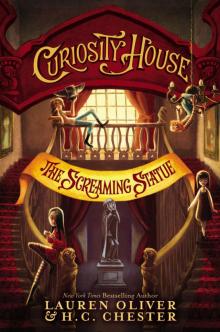 The Screaming Statue
The Screaming Statue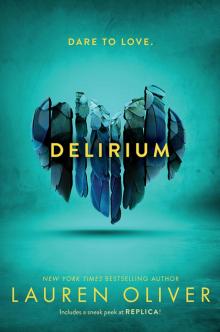 Delirium
Delirium Before I Fall
Before I Fall Rooms
Rooms Replica
Replica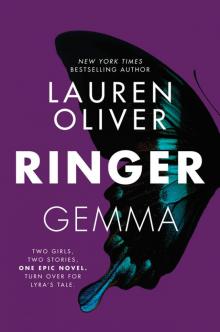 Ringer
Ringer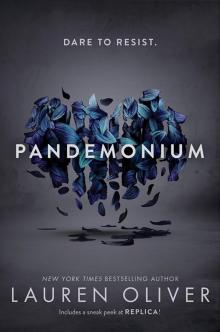 Pandemonium
Pandemonium The Shrunken Head
The Shrunken Head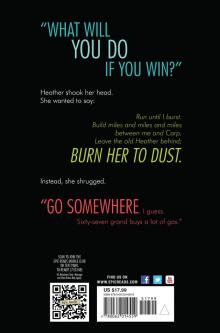 Panic
Panic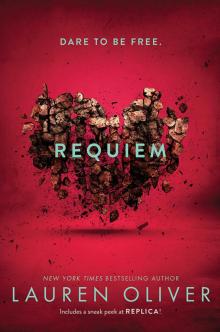 Requiem
Requiem The Spindlers
The Spindlers Annabel
Annabel Liesl & Po
Liesl & Po Raven
Raven Alex
Alex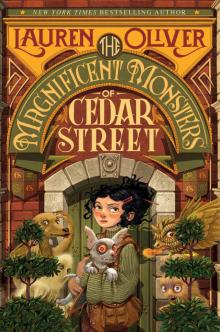 The Magnificent Monsters of Cedar Street
The Magnificent Monsters of Cedar Street Vanishing Girls
Vanishing Girls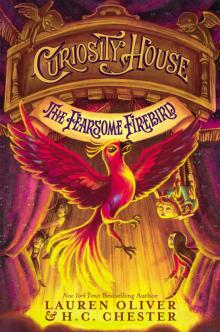 The Fearsome Firebird
The Fearsome Firebird Raven: A Delirium Short Story
Raven: A Delirium Short Story Annabel: A Delirium Short Story
Annabel: A Delirium Short Story Hana: A Delirium Short Story
Hana: A Delirium Short Story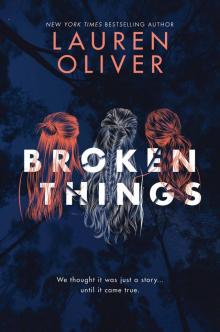 Broken Things
Broken Things Ringer (Replica)
Ringer (Replica) Alex (delirium)
Alex (delirium)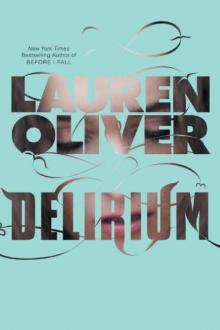 Delirium dt-1
Delirium dt-1